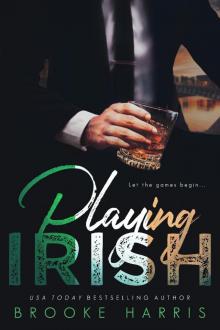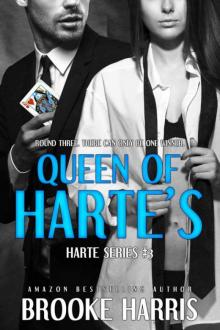- Home
- Brooke Harris
When It Rains: The bittersweet romance you won't want to miss Page 18
When It Rains: The bittersweet romance you won't want to miss Read online
Page 18
‘Always has been.’ My mother smiles.
‘Carry Me Home has a small library,’ he says. ‘I don’t know if there’d be much to choose from but ...’
‘We already have a book,’ I interrupt.
The doctor drops his eyes to the mound of papers under my arm. I can see curiosity twinkle in his hazel irises, but he doesn’t ask any more questions.
‘I’ll try to arrange the move for this afternoon,’ he says, ‘but we may have to wait on a bed. I’ll let you know as soon as I have confirmation.’
‘Thank you, Dr Matthews.’ My mother exhales. ‘Thank you for all you’ve done.’
‘I only wish it could be more,’ he replies sincerely as he turns and slowly walks away.
‘Wait for a bed?’ I snort when the doctor is out of earshot. ‘So wait for someone else to die, he means.’
‘Holly. Stop it,’ my mother scolds. ‘I don’t want to hear that kind of talk. It’s not helping anyone. You included.’
‘Holly, c’mon,’ Nate encourages. ‘It’s just your hormones playing havoc with you. You’re not yourself.’
‘It’s not my fucking hormone’s fault that Nana is dying, Nate. Jesus, what is wrong with you all? Why are you so calm? Nana is dying. She’s fucking dying. How can you just sit around and wait for her to go? I can’t stand it.’
My mother pulls her arm away from me and spins around on the spot, stopping when we’re face to face. She jams her hands onto her hips and tilts her chin down towards me. It’s a familiar pose. And despite her thinner, older frame, the position is just as assertive as it was when I was a little girl.
‘Days, Holly. That’s what they’re saying.’ My mother softens. ‘Nana has days left. I know how scared and angry you are. I am too. But didn’t you hear what the doctor said? Don’t be so full of anger that you can’t enjoy this time.’
‘How can we enjoy watching her go?’
‘Don’t be blinded by the pain of knowing she’s going, Holly. Open your eyes and see that she’s still here with us now. Cancer will take her from us, and there’s nothing more the doctors can do. But don’t let it take our last memories. These days don’t belong to cancer. They belong to our family. We need to savour them. And keep them close to our hearts forever. Because even though cancer can take your grandmother, it can never touch how much we love her.’
‘But it’s not fair, Mom.’ I sniffle. ‘I’m not ready to say goodbye.’
‘No one is ever ready to say goodbye, Holly.’
Silent tears stream down my mother’s cheeks, and I instinctively lean forward and wrap my arms around her. She drops her head onto my shoulder, and I hold her as she finally lets her pain out. Angry, tear-soaked sobs shake her whole body. And at this moment, our roles suddenly reverse. She’s a helpless child afraid to be alone, and I’m a grown adult trying to find a way to comfort her. But I don’t have words. I know I can’t say anything to change this. So I just hold her. Tight—like I might never let go again. I feel her chest rise and fall with heaving breaths as she presses against me, and I know just hugging her helps so much more than any words could.
I hug my mother all the time. I hug her when I visit for Sunday lunch; Mom rushes to answer the door with her apron on, holding a wooden spoon in her hand, and we hug briefly before she darts back into the kitchen. I hug her when I drop my parents off at the airport once a year on their annual holiday because my father refuses to use the long-term car park in case someone steals their car. But I’ve never hugged my mother like this before.
Within seconds, my mother pulls herself together as quickly as she fell apart. She shoves her hand up her sleeve and slides out a tissue. And I realise that just because it’s the first time I’ve seen my mother fall apart and cry doesn’t mean she hasn’t cried alone.
‘A hospice,’ I say, the words feeling bulky in my mouth, but I try to smile.
My mother needs me to smile.
‘It’s time, Holly.’ Mom shakes her head slowly. ‘We all know that. And I’ve heard good things about Carry Me Home. Nana will be very comfortable there.’
‘Comfortable,’ I echo. ‘That’s good.’
‘Come on,’ my mother says, sliding her arm around my back to tuck my hip next to her. ‘Will you come with me to tell her?’
My mother has always been slim. I remember being the same dress size as her by the time I was eleven and I’m at least a couple of sizes bigger now. But suddenly, my mother seems even more tiny than usual. As if the doctor’s words have physically crushed her.
‘Of course.’ I sniffle.
‘Aren’t you coming?’ my mother says when Nate sits back down.
Nate shakes his head and slides his phone out of his jeans pocket. ‘I really need to catch up on some emails. I hope you don’t mind.’
Nate’s lying. I can tell because his eyebrows ruffle and try to come together in the middle. It’s his bluffing face. I see it all the time at work when he’s trying to wriggle out of lunch with an annoying colleague or when he blames a missed deadline on the stomach flu.
I glance at the phone in Nate’s trembling fingers, and I know his white lie stretches further than an overwhelming desire to beat my Candy Crush score. He’s giving Mom and me alone time with Nana. The Talbot Girls.
Twenty – Three
Fridays have gradually become my favourite day of the week. Sketch picks me up at ten on the dot, and unlike most mornings when he has to rush back to the farm, Fridays are unique. We drive slowly into town, and check that the square is ready for the farmers market the following morning. We exit the car and walk the perimeter of the square. Never hand in hand in case the eyes of busybody neighbours are watching, but regardless, it’s a morning stroll side by side and we both enjoy it, almost as much as if we were physically touching. I’m not entirely sure what we’re doing or what we’re checking, or if Sketch is simply seizing a sneaky opportunity for us to be together in public and made-up preparations for the farmers market is the best excuse he could come up with.
Often, we lap the square twice, especially if the weather is dry and warm. We discuss all sorts. Sometimes, we laugh and giggle and reminisce about the past, and other times, we discuss what the future holds. Sketch always fills my head with silly notions about running away together to somewhere warm and sunny.
Today is no different from any other Friday, except we indulge in an ice cream from the corner shop, and I watch Sketch’s lips sweep around the creamy vanilla top and imagine how good they will feel pressed against me later.
‘So what do you say, Annie?’ Sketch asks, finishing his ice cream just as we sit in the car.
‘What do I think about what?’ I ask coyly, knowing exactly what he means. He asks the same question at the same time every Friday.
‘What do you think about running away?’ He smiles.
I think it sounds like the plot from one of my romance novels. And I can’t hide my overzealous grin as I imagine Sketch, the hero, sweeping me off my feet as we dash into the sunset. But I also know novels are fiction, and real life doesn’t play out that way.
‘We’d just catch a boat and be gone,’ Sketch says with a snap of his fingers as we roll up the long, winding driveway leading to the large farmhouse. ‘We’d sail to Wales first and then France. I could make a living selling paintings. The French have good taste in art,’ he says as if he knows, and he has such passion in his eyes it’s hard not to get caught up in the romantic notion.
‘And where would we live?’ I giggle as we come to a jerky stop next to a lonely apple tree that grows in an odd spot where the dusty driveway meets the grass.
‘France is dripping in sunshine,’ Sketch adds. ‘It’s an artist’s paradise. We’d travel by day, and when our feet are too tired to walk another step, we’d fall on the beach and sleep the night away as the waves creep in to kiss our toes.’
‘It sounds delightful, doesn’t it?’ I swoon. ‘Say we’ll go someday. Say we’ll wear a beret and eat baguettes. Even if we only eve
r discuss it.’
‘No.’ Sketch’s eyes widen. ‘We’ll do it. We’ll do it for real. I’m serious, Annie. There’s a big, bad world out there, and I, for one, want to see it. And I want to see it with you by my side.’
‘Someday,’ I pacify, repeating my usual answer. ‘Maybe someday.’
Three months have passed since I first started working at Sketch’s farm, and we’ve fallen into a comfortable routine. I spend the mornings cooking and cleaning, and the afternoons reading in the orchard as Sketch paints. Sometimes, I even indulge in the notion that the farm is my home, and I’m not just an employee. For a couple of hours every day, I let myself believe that I belong here, and I don’t have to go back to my father’s house ever again. But, of course, evenings come, and reality stings.
Going home is hard, but it’s always made easier by my mother’s bright smile when I reach the front door. Seeing her warm and putting on weight is wonderful. The leftovers I bring home most days have done her a world of good. She’s still underweight, but her collarbones don’t protrude through her blouse anymore, and her skin is bright and her cheeks are rosy. She’s really very pretty; I can’t believe I never noticed before.
Of course, my pay packet has been well received by Pa also. He’s delighted to have more drinking money. It was inevitable that he’d spend less time at home and more time in The Blackwell Tavern. His absence is a welcome relief for Ma during the day, but when he returns at night, drunk as a skunk, it’s terrifying.
The extra liquor made everything so bad initially that after just a week, I thought I might have to give up working at Talbot’s farm. When Sketch came to pick me up on the first day of our second week, I was ready to break the news to him and offer my heart-breaking resignation, but Sketch didn’t give me a chance to speak. He took one look at the greenish black that dotted across my cheekbone in the shape of Pa’s knuckles, and he hopped out of the car. I don’t know what he said to Pa that morning, or if he said anything at all, but it was a turning point nonetheless. Pa’s bicycle had a terrible accident that day. The front tyre folded over on itself, and the chain broke in several places. The bicycle was a write-off. I never asked Sketch if he was responsible, and he never confessed. But one thing is for sure, walking five miles home from the pub takes three times as long as cycling the same route, and the crisp night air does wonders to sober Pa up before he reaches home after a drinking session. Three months of working at Talbot’s farm has been horrendous for Pa’s liver, but it’s been wonderful for Ma’s health and my heart. I never thought about resigning again.
This morning, just like every other, Sketch opens the front door and steps aside like a gentleman to let me in ahead of him. And this morning, as with every morning, I hop over the concrete slab just in front of the door and land in the hall with a bang as the heels of my shoes pound against the floor tiles. The concrete slab wobbles and creaks when you step on it, and I’m certain it will break soon. And this morning, as with every morning, Sketch laughs at my efforts and steps right in the centre of the slab after I pass. He closes the door behind us, and a sudden gust of wind charges in and blows straight up my skirt, raising the blue satin into the air and exposing my knickers. And this morning, unlike any other morning, I can feel Sketch’s eyes drop onto the cheeks of my buttocks, and I take ever so slightly longer than I should to guide my skirt back into its rightful place and walk towards the kitchen
The inside of the Talbot’s farmhouse is the opposite of my home. For such a large building, it’s warm and inviting, and the people inside love each other. Mr Talbot isn’t great with words, and he buries his feelings deeper than the slurry pit in the backyard, but I see it in the way he looks at his son. The sparkle of pride in his eyes is unmistakeable. He’s proud of the man Sketch is growing up to be. And I can only imagine the love within the walls of this house when Mrs Talbot was alive. It must have been a wonderful place to grow up.
But despite its warmth and charm, the house is very obviously missing a woman’s touch.
‘Pa boxed up all Ma’s bits and pieces when she died,’ Sketch explained on my first day when I asked why most of the drawers in the kitchen were empty. Aside from teaspoons and butter knives, there really was little else in the kitchen, and the scullery was even more depressing.
‘We came home after her funeral, and Pa literally swept through the house like a whirlwind and boxed up all her possessions. By the next morning, it was as if she had never even lived here.’ Sketch choked back tears before he made his way up the attic to fetch a small cardboard box with bold, handwritten black letters on top. Blair’s Kitchen Things, it said.
We didn’t discuss Mrs Talbot’s possessions again, but over the past three months, I’ve gradually noticed more and more feminine bits and pieces appearing around the house. I can only assume they belong to Mrs Talbot, and Sketch is slowly retrieving them from the attic and reinstating them in their rightful places. The yellow and cream cushions that arrived on the kitchen chairs a month back brighten up the whole room. And I sometimes imagine Mrs Talbot sitting by the warmth of the stove as she embroidered the beautiful floral design onto each of the six cushions with pride.
Sketch doesn’t notice, but he smiles every time he passes by something that belonged to his mother. The candleholder in the centre of the kitchen table makes his eyes dance with memories, and her apron that I often wear turns him into a giddy schoolboy impatiently waiting for freshly baked brown bread.
Even though I’ve grown used to noticing Mrs Talbot’s things appearing out of nowhere, the large painting of her that I notice suddenly hanging in the hall today takes my breath away. And I stand, statue like and frozen to the spot, unable to take my eyes off it.
‘I spent so long trying to push her memory away,’ Sketch confesses, placing his hand on the small of my back as we both gaze up at the beautiful woman captured in watercolour. ‘You know, so it wouldn’t hurt so much.’
I nod. My heart aches for him. And I wish I’d had a chance to know her. I bet she was as delightful a person as her angelic face suggests.
‘We never discuss her,’ Sketch says. ‘Pa wouldn’t even say her name after she died. I think he just wanted to forget she ever existed.’
‘I don’t understand,’ I say. ‘Why would you want to forget someone you loved with all your heart?’
Sketch doesn’t answer my question. He slides his arm around my waist, and with his hand firmly clutching my hip, he pulls me close to him. I can feel his hunger for closeness. I can sense his desperate need to hold me. My upper body softens, and I soak up his need for my love as if I were a sponge. The top of my head comes in line with his shoulder, and I can feel his deep, poignant breath dance across the top of my hair. His grip tightens on my hip, and I turn just enough to curl into him in response. My ear presses against his chest, and I can hear the beating of his heart through his crisp, white cotton t-shirt. I cherish the sound that plays out like the rhythm of a disciplined drum. The sound of Sketch’s heart is music to my ears because I know it belongs to me.
‘I didn’t hang that painting there, Annie,’ Sketch whispers after a long comfortable silence.
‘But it’s one of yours, isn’t it?’ I say, recognising the brushstrokes and choice of colours. I think that’s why I like it so much. It reminds me of the painting my father threw on the fire.
‘Yes.’ Sketch smiles. ‘But it’s not very good. I painted it a couple of months after she died, and I really didn’t know what I was doing back then.’
I lift my head and twist my neck to stare at it some more. I can’t find fault, and I wonder whether Sketch means he didn’t know how to paint or if he didn’t know how to cope with his mother’s death. I don’t ask.
‘The shading is all wrong here. See.’ Sketch releases me to point towards the bright yellow paint that creates the full skirt of Mrs Talbot’s dress. ‘It should be lighter here and darker there,’ he explains.
I nod as if I understand, but I don’t know anything about art.
I don’t think it matters. I think it’s just important that I see it. That anyone, everyone who comes into the house sees it. It doesn’t matter if it’s a masterpiece or an amateur attempt. It’s so much more than a painting. It’s a declaration of love. Sketch loved his mother with all his heart. He loved his mother the way I love mine. And it broke his heart when she left him. It would destroy my mother if I ever left her. My heart sinks as I slowly wonder if falling in love with Sketch is terribly unfair. Not to me, though, to him. I can never run away with him. Not to France. Not to anywhere. I can never even belong completely to him. For the first time since Sketch broke my father’s bicycle, I start to accept that this job can’t last forever.
Sketch shakes his head. ‘What are you thinking, Annie?’
‘Hmm?’ I say, dragging my eyes away from the painting to stare at my toes.
Sketch pulls his shoulders up to his ears and lets them fall as he breathes out. ‘Oh Annie, how am I going to help you to understand that I’m not your father, and you don’t have to watch what you say around me?’
I pull away from him and turn my back to the painting so we can stand face to face, and I can look into his kind eyes. He’s disappointed. Or hurt. Or both. I don’t intentionally watch what I say when I’m with him. Not anymore. The Talbot farmhouse is one of the few places in the world where I feel genuinely comfortable being myself.
‘I’m not quiet because I’m afraid to speak up,’ I explain. ‘I just ...’ I shrug and reach for his hand. His fingers slip between mine, locking us together. ‘I guess I just don’t know what to say. But I like listening to you discuss her.’
‘Do you really want to know who hung that painting?’ Sketch asks.
‘Who?’ I nod enthusiastically.
‘Pa,’ Sketch says proudly.
I smile so wide that I can feel the muscles next to my ears twitch.
‘Actually,’ Sketch continues quite seriously, ‘I’d forgotten I’d painted it, since I haven’t seen it in a long time. Sometimes, when I was younger, I used to go up into the attic and just sit amongst the boxes of her stuff.’

 The Forever Gift
The Forever Gift Playing Irish
Playing Irish When It Rains: The bittersweet romance you won't want to miss
When It Rains: The bittersweet romance you won't want to miss Queen of Harte's
Queen of Harte's